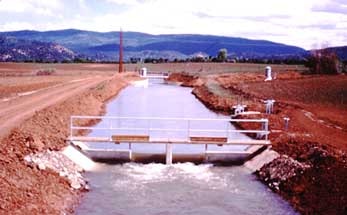Ditches and Diversions

People need to be aware of their rights and responsibilities in order to avoid the conflicts which commonly erupt between neighbors over the fair sharing of a scarce supply of water. Statutes are also in place to define the relationship between the water user, the state administrators and the private ditch companies. If you have legal questions, a water attorney can be very helpful in explaining your rights under Colorado water law. The Colorado Division of Water Resources is the state agency charged with the administration of the state’s rivers and reservoirs and the enforcement of Colorado?s water laws and statutes. Water in Colorado is treated as a private property right that is bought and sold and, at times, can be separated from the land on which it is used. The owner may sell or lease the water rights to others, separate from the land. Sale transactions are recorded at the county where the sale occurs and tracking the ownership of the rights is done through title and deed research, just as with land transactions.
Developers of subdivisions do not always sell the rights to the water with the land, either assuming water will be available to the new land owner from another source or has other uses for the water right. As agricultural land is subdivided, lot lines and new road construction may interfere with historical irrigation patterns which followed contours or the natural slope of the land. This makes the administration and division of water more difficult and often results in conflicts that need to be resolved with the other parties on the ditch system.
Water diversions are regulated and measured by the State Water Commissioner under direction of the Division Engineer and the State Engineer. Once the water is in the ditch, owners may share or distribute those supplies according to ditch agreements or by-laws.
Ditches may be private or individually owned or may be “mutual” incorporated ditches. Water in the incorporated ditches is allocated by shares issued by the company. Those shares represent proportional amounts of decreed water rights. Stock certificates of ownership are issued by some ditch companies. Each ditch company operates under by-laws and any changes require coordination with ditch officials to ensure that the water can still be delivered.
Only those people who have rights or shares in the ditch are allowed to remove water from it. Pumps may not be set in a ditch, ponds may not be constructed, and new “turnouts” may not be made on the ditch without the approval of the ditch company officials. In the case of a privately owned ditch, civil action may be taken against anyone who interferes with or obstructs the flow of water through the ditch. While the conflicts within a ditch system are a civil matter to be resolved between neighbors, the ditch officials and the State Water Commissioner may be able to assist with an opinion or advice.
In Southwestern Colorado many areas have an ample water supply which may provide options toward resolution of water disputes. Water delivery problems or ditch disputes may have a considerable history since the problems often result because of the particular geography in an area rather than the personalities who are presently involved with the problem. As a last resort, the parties may have to take disputes before the court for a legal determination or solution.
In Colorado, ditches and water rights are defined by the point of diversion, diversion rate, priority, source, amount of use, place of use and other conditions found to be necessary when the decree was granted in water court. Colorado’s history of water rights statute development and case law defines the roles and responsibilities of water rights owners and ditch administrators.
Diversions in the state of Colorado are subject to the priority system, “first in time, first in right,” established in 19th century mining camps. The earliest diversion from a stream or aquifer put to beneficial use is “senior” to subsequent diversions and more junior water rights are shut off as the stream flow decreases.State law can restrict the movement of water between owners if material injury to other rights could occur. If any of the decreed water right attributes is changed, water court action is required. This would include a change in use of the water or a change to a new point of diversion. The division engineer, water commissioner, or ditch riders may order control gates and measuring structures into ditches or at the headgates whenever it becomes necessary to determine or control the flow of water out of the stream or ditch.
If these orders have not been complied with after a period of notice the ditch may be shut off and locked shut, or “tagged” with a signed card ordering the headgate to be set at a certain level. The water commissioner will order curtailment of non-decreed beneficial uses if the stream is being strictly administered at the time. During times when there is a call on the river, decreed but more junior water rights will also be shut off in order to deliver water to the more senior rights in the system.
The appropriation of unallocated water is provided for in the state constitution – “the right to appropriate un-appropriated water in the state of Colorado shall never be denied.” A person may enlarge a ditch or pull new ditches to apply water to new lands or to other beneficial uses. The existing ditch owners and land owners through which the ditch crosses must be justly compensated. This compensation may come in the form of agreements between ditch users for maintenance, monetary compensation or a court-determined payment.
Ditches have an established right-of-way to carry water through public and private property due to historic practices. Even if no recorded documentation of the easement exists, this prescribed right of carriage allows the continued use and reasonable access to maintain the ditch and/or easement. Enlargements of the ditch may still require a re-negotiation of that easement.
Click to download the WIP Ditches and Diversions brochure
For more information on ditches, diversions and Colorado water rights, please contact the Colorado Division of Water Resources:
Division of Water Resources
1474 Main Avenue
Durango, Colorado 81301
(970) 247-1845

